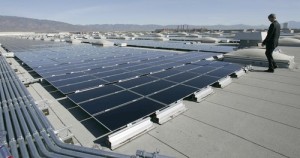On the energy front, that is. LA Times lays out the situation of subsidized commercial rooftop solar vs. private investment. Much of the action is going to be on the regulatory front.
Consumer activists object. They say Edison should be looking to cheaper sources of renewable power, such as large solar and wind farms and geothermal plants. They contend that Edison International shareholders, not utility ratepayers, should finance the company’s huge bet on photovoltaic rooftop solar, one of the most expensive forms of clean energy.
An independent advocacy group has asked the Utilities commission to reject the ratepayer-financed plan, fearing unfair advantage over private sector entrepreneurs. But isn’t it the case that if the Edison plan creates demand for materials (and the power these materials generate), more materials and their power will appear? What is the uniqueness of renewable energy production that it will not obey or at least adhere to the rules of the marketplace? While not perfectly analogous to coal-fired power production, is it really exceptional?
Again, as much of this will be decided through sober, commission-type deliberations as will have to be amended later, as we learn more about and become familiar with the nature of distributed power generation. But the pre-conceived notions (free-marketeer or egalitarian) that guide these at the beginning will mean a lot.

